Workshop
Develop microservices (and web APIs) in PHP
by Enrico Zimuel
Principal Software Engineer @ Elastic
Cloud Conf, Turin, 27th March 2019
About me
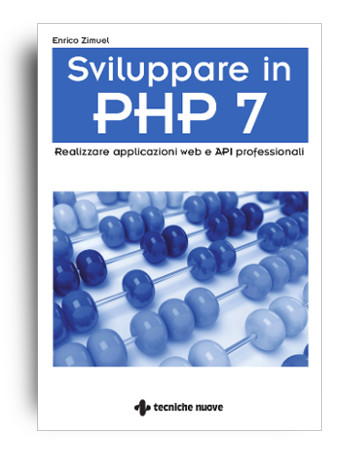
|
|
Microservice
...the microservice architectural style is an approach to developing a single application as a suite of small services, each running in its own process and communicating with lightweight mechanisms, often an HTTP resource API
- Martin Fowler
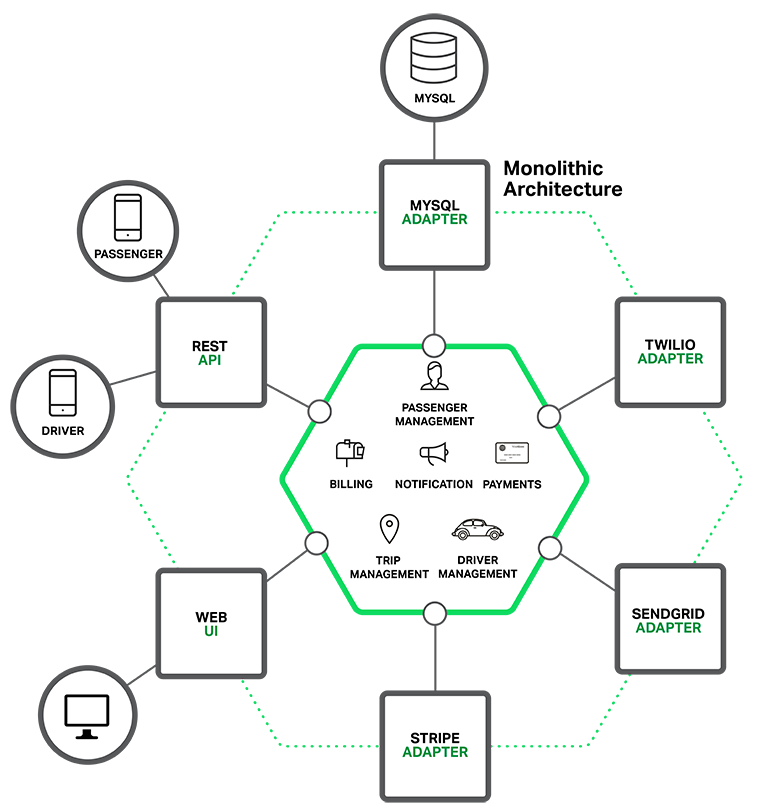
Source: Introduction to microservices

Source: Introduction to microservices
Benefit
- Separation of concerns
- Modularity
- Encapsulation
- Scalability
- Horizontally scaling
- Workload partitioning
Cons
- Network latency
- Debugging
- New architecture challenges:
- Autodiscovery
- Telemetry
- Everything needs to be automated
PHP
Microservices in PHP
- PHP is easy to deploy
- PHP 7 is super fast!
- Big community
- Libraries/Frameworks
- Async in PHP (Swoole, ReactPHP, ...)
PHP 7 speed
$a = [];
for ($i = 0; $i < 1000000; $i++) {
$a[$i] = ["hello"];
}
echo memory_get_usage(true);
| PHP 5.6 | PHP 7.2 | |
| Memory | 428 MB | 34 MB |
| Execution time | 0.59 sec | 0.06 sec |
Other languages
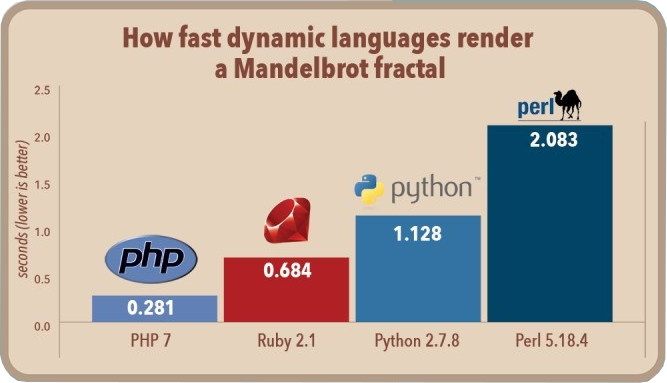 PHP 7 is faster than Python 3!
PHP 7 is faster than Python 3!
PHP 7 migration: case sudy
Web APIs
HTTP IN & OUT

Example
HTTP Request:
GET /api/version
HTTP Response:
HTTP/1.1 200 OK
Connection: close
Content-Length: 17
Content-Type: application/json
{
"version": "1.0"
}
Building a Web API
- Managing the HTTP request and response
- Choosing a representation format
- Choosing an error format
- Filtering & validating input data
- Authenticating HTTP requests
- Authorizing HTTP requests
- Documentation
HTTP Methods (REST approach)
- GET: read a resource
- HEAD: read without body
- POST: create a resource
- PUT: replace a resource
- PATCH: update a resource
- DELETE: delete a resource
- OPTIONS: information about a resource
HTTP Status-code
- Informational 1xx: 100 Continue
- Successful 2xx: 200 OK, 201 Created, 202 Accepted
- Redirection 3xx: 301 Moved Permanently, 307 Temporary Redirect
- Client Error 4xx: 401 Unauthorized, 404 Not Found, 405 Method Not Allowed
- Server Error 5xx: 500 Internal Server Error, 503 Service Unavailable
Representation format
- JSON (JavaScript Object Notation)
in PHP json_encode(), json_decode() - XML (eXtensible Markup Language)
in PHP SimpleXML, libxml, DOM, etc
HAL-JSON
HAL-JSON (Hypertext Application Language JSON), Internet-Draft
GET /api/user/ezimuel
{
"_links": {
"self": {
"href": "http://domain/api/user/ezimuel"
},
"contacts": [
{ "href": "http://domain/api/user/mwop" },
{ "href": "http://domain/api/user/zeevs" }
]
},
"id": "ezimuel",
"name": "Enrico Zimuel"
}
Error format
Problem Details (RFC 7807)
HTTP/1.1 400 Bad Request
Content-Type: application/problem+json
Content-Language: en
{
"type": "https://example.net/validation-error",
"title": "Your request parameters didn't validate.",
"invalid-params": [
{
"name": "age",
"reason": "must be a positive integer"
},
]
}
Authentication
Documentation
HTTP in PHP
HTTP message in PHP
Global variables:
- $_SERVER
- $_POST
- $_GET
- $_FILES
- $_COOKIE
HTTP functions in PHP
- http_response_code()
- header(), header_remove(), headers_list(), headers_sent()
- setcookie(), setrawcookie()
- gethostname(), etc
Manage HTTP in PHP
- PHP does not offer an object representation of HTTP request/response
- Unfortunately, It's quite hard to manage HTTP messages in PHP!
PHP-FIG
PHP FIG
- PHP Framework Interop Group (PHP FIG)
- A working group for defining common standards to interop between PHP frameworks/libraries
- PHP Standards Recommendations (PSR)
- More information at php-fig.org
PSR-7
Common interfaces for representing HTTP messages as described in RFC 7230 and RFC 7231, and URIs for use with HTTP messages as described in RFC 3986
PSR-7 interfaces
- github: psr/http-message
- Psr\Http\Message\MessageInterface
- Psr\Http\Message\RequestInterface
- Psr\Http\Message\ResponseInterface
- Psr\Http\Message\ServerRequestInterface
- Psr\Http\Message\StreamInterface
- Psr\Http\Message\UploadedFileInterface
- Psr\Http\Message\UriInterface
Example
// Returns an empty array if not found:
$header = $message->getHeader('Accept');
// Returns an empty string if not found:
$header = $message->getHeaderLine('Accept');
// Test for a header:
if (! $message->hasHeader('Accept')) {
}
// If the header has multiple values, fetch them
// as an array:
$values = $message->getHeader('X-Foo');
// Or as a comma-separated string:
$values = $message->getHeaderLine('X-Foo');
Immutability
- PSR-7 Request and Response model immutability
- Messages are modeled as value objects; a change to any value results in a new instance
- PSR-7 Stream does not model immutability
zendframework/zend-diactoros implements PSR-7
Example
$response = $response->withStatus(418, "I'm a teapot");
$query = $request->getQueryParams();
$body = $request->getBodyParams();
$request = $request->withBodyParams(json_decode($body));
PSR-7 implementation
Swoole

- Swoole is an async programming framework for PHP 7
- PHP extension, install:
pecl install swoole - Released under Apache license 2.0
- More info at swoole.co.uk
Features
- Event-driven, asynchronous programming for PHP
- Async TCP / UDP / HTTP / Websocket / HTTP2 client/server side API
- IPv4 / IPv6 / Unixsocket / TCP/ UDP and SSL / TLS support
- High performance and scalable
- Fast serializer / unserializer
- Milliseconds task scheduler
Swoole vs. PHP-FPM
- Forks a number of worker processes based on CPU core number
- Fupports Long-live connections
- Manage and reuse the status in memory
- Executes Non-blocking code (async, coroutine)
HTTP Server
use Swoole\Http\Server;
$http = new Server("127.0.0.1", 9501);
$http->on("start", function ($server) {
echo "Started at http://127.0.0.1:9501\n";
});
$http->on("request", function ($request, $response) {
$response->header("Content-Type", "text/plain");
$response->end("Hello World\n");
});
$http->start();
Test: 16K req/sec on CPU i5-2500, 16 GB RAM, PHP 7.2.12, Swoole 4.2.9
Event loop
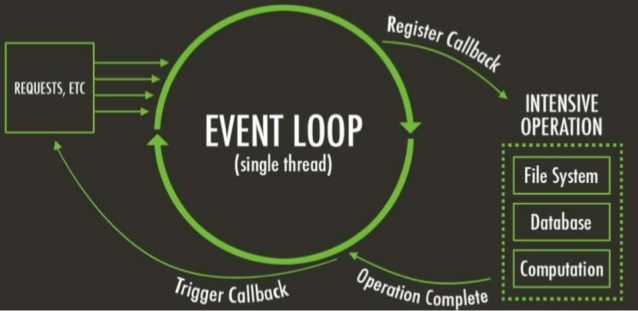
Middleware
Middleware
A function that gets a request and generates a response
function ($request)
{
// do something with $request
return $response;
}
Delegating middleware
function ($request, callable $delegate)
{
// delegating $request to another middleware
$response = $delegate($request);
return $response;
}
Middleware onion
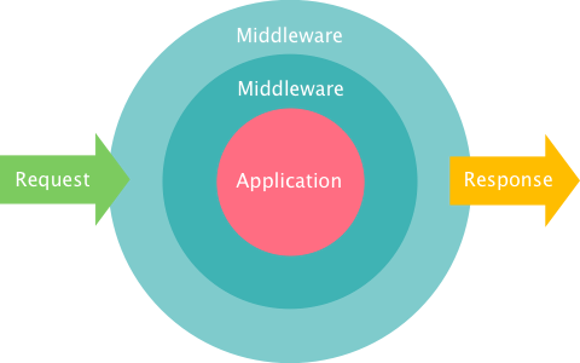
Execution pipeline
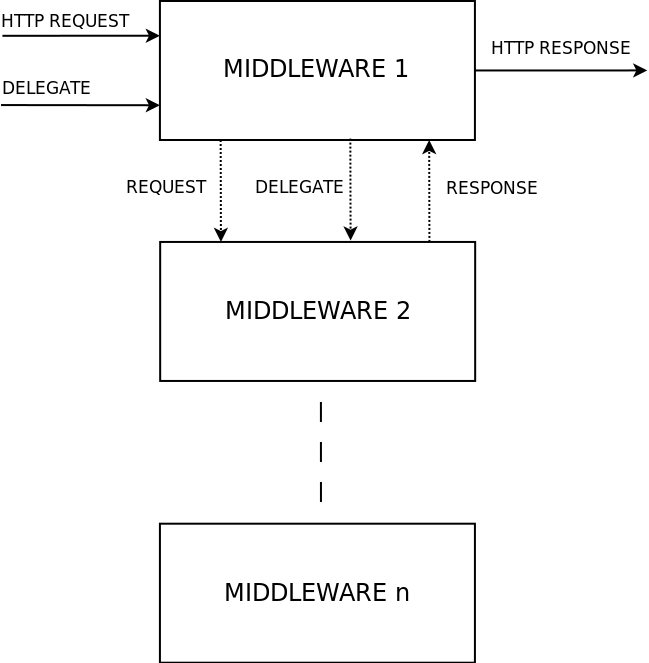
Example: cache
function ($request, callable $delegate) use ($cache)
{
if ($cache->has($request)) {
return $cache->get($request);
}
$response = $delegate($request);
$cache->set($request, $response);
return $response;
}
PSR-15
Common interfaces for HTTP server request handlers and HTTP server middleware components that use HTTP messages as described by PSR-7
PSR-15: Handler
namespace Psr\Http\Server;
use Psr\Http\Message\ResponseInterface;
use Psr\Http\Message\ServerRequestInterface;
interface RequestHandlerInterface
{
public function handle(
ServerRequestInterface $request
): ResponseInterface;
}
An handler returns a response, without delegate
PSR-15: Middleware
namespace Psr\Http\Server;
use Psr\Http\Message\ResponseInterface;
use Psr\Http\Message\ServerRequestInterface;
interface MiddlewareInterface
{
public function process(
ServerRequestInterface $request,
RequestHandlerInterface $handler
): ResponseInterface;
}
A middleware participates in processing an HTTP message, it may deletegate.
Expressive

The PHP framework for middleware applications
- PSR-7 support (using zend-diactoros)
- PSR-15 support
- Piping workflow (using zend-stratigility)
- Features: routing, dependency injection, templating, error handling
- Last release 3.2.3, 5th Nov 2018
- Official website: getexpressive.org
Installation
You can install Expressive using composer:
composer create-project zendframework/zend-expressive-skeleton api
Routes
$app->get('/api/ping', function ($request) {
return JsonResponse(['ack' => time()])
});
// or implement a RequestHandlerInterface
$app->get('/api/ping', App\Handler\PingHandler::class);
PingHandler
namespace App\Handler;
use Psr\Http\Message\ResponseInterface;
use Psr\Http\Message\ServerRequestInterface;
use Psr\Http\Server\RequestHandlerInterface;
use Zend\Diactoros\Response\JsonResponse;
class PingHandler implements RequestHandlerInterface
{
public function handle(
ServerRequestInterface $request
) : ResponseInterface {
return new JsonResponse(['ack' => time()]);
}
}
Pipeline
$app->pipe(ErrorHandler::class);
$app->pipe(ServerUrlMiddleware::class);
$app->pipe(RouteMiddleware::class);
$app->pipe(ImplicitHeadMiddleware::class);
$app->pipe(ImplicitOptionsMiddleware::class);
$app->pipe(MethodNotAllowedMiddleware::class);
$app->pipe(UrlHelperMiddleware::class);
$app->pipe(ProblemDetailsMiddleware::class);
$app->pipe(DispatchMiddleware::class);
$app->pipe(NotFoundHandler::class);
Route a REST API
$app->route('/api/users[/{id}]', [
Authentication\AuthenticationMiddleware::class,
Authorization\AuthorizationMiddleware::class,
Api\Action\UserAction::class
], ['GET', 'POST', 'PATCH', 'DELETE'], 'api.users');
// or route each HTTP method
$app->get('/api/users[/{id}]', ..., 'api.users.get');
$app->post('/api/users', ..., 'api.users.post');
$app->patch('/api/users/{id}', ..., 'api.users.patch');
$app->delete('/api/users/{id}', ..., 'api.users.delete');
Tools for Web API
- HAL-JSON: zend-expressive-hal
- Problem details: zend-problem-details
- Filtering & validation: zend-inputfilter
- Authentication (HTTP Basic, OAuth2): zend-expressive-authentication
- Authorization (ACL, RBAC): zend-expressive-authorization
Expressive with Swoole
Install:
composer require zendframework/zend-expressive-swoole
Usage:
vendor/bin/zend-expressive-swoole start
Open your browser at localhost:8080
PHP + Expressive + Swoole
Run a web application from CLI
Simplify the deploy (only 1 container)
A web server (nginx) can be used as load balancer
Benchmark
2-4x faster than Nginx and Apache
| Req/sec (mean) | |
| Nginx | 1418.23 |
| Apache | 1915.62 |
| Swoole | 4864.34 |
Testing environment:
Ubuntu 18.04, Expressive Skeleton 3.2.3, PHP 7.2.12, Nginx 1.14 + FPM,
Apache 2.4.29 + mod_php, Swoole 4.2.9, CPU i5-2500, 16 GB RAM, HD SSD
Elasticsearch

Elasticsearch & PHP
Example
use Elasticsearch\ClientBuilder;
$client = ClientBuilder::create()->build();
$params = [
'index' => 'my_index',
'type' => 'my_type',
'id' => 'my_id',
'body' => ['testField' => 'abc']
];
$response = $client->index($params);
print_r($response);

- Kibana is an open source data visualization plugin for Elasticsearch
- It provides visualization capabilities on top of the content indexed on an Elasticsearch cluster
- More information here
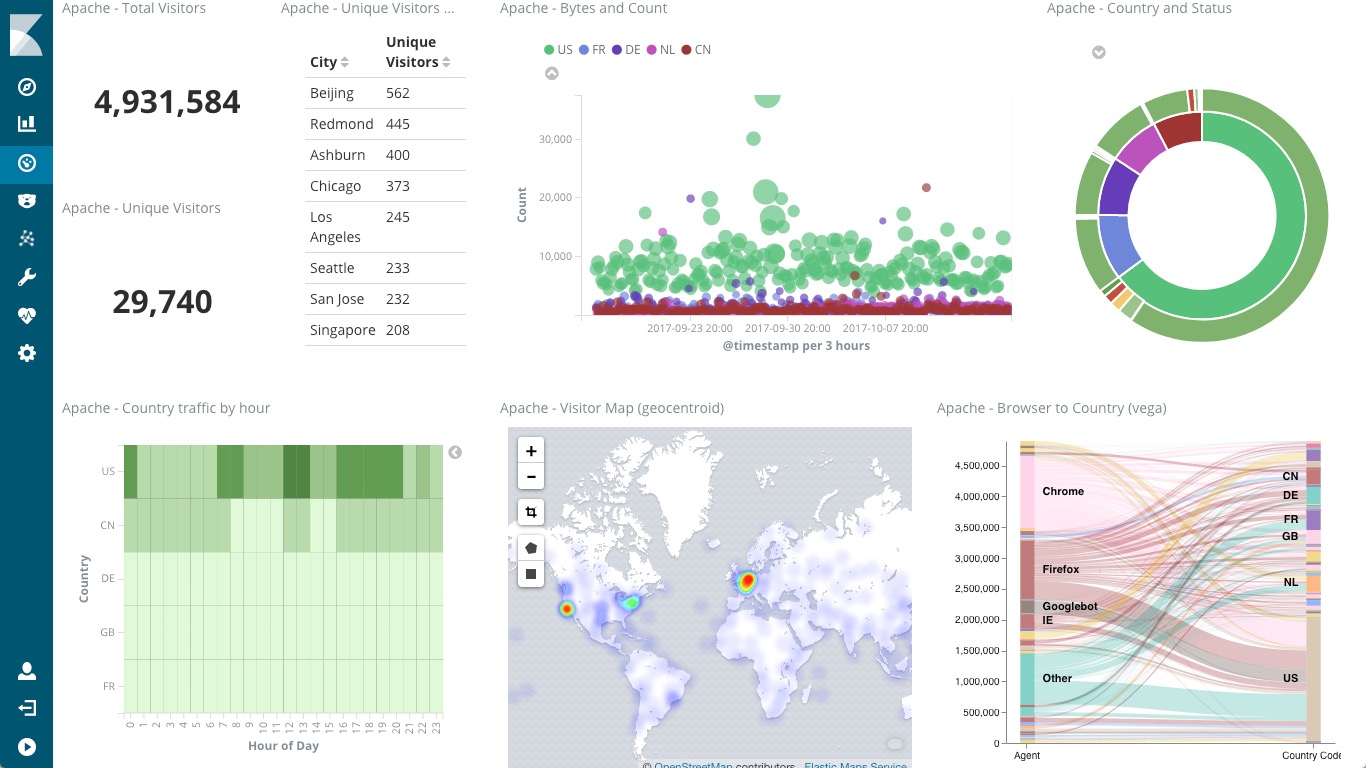
Hands-on
References
- Michael Bryzek, Design Microservice Architectures the Right Way, QCon 2018 talk
- Mastering Chaos - A Netflix Guide to Microservices, QCon 2016 talk
- Martin Fowler, Microservices, GOTO 2014 talk
- Introduction to Microservices, Nginx blog post
- Designing and Deploying Microservices, Nginx ebook (free)
- Richard Rodger, The Tao of microservices, Manning Pubblications, 2017
- M.Amundsen, M.McLarty, R.Mitra, I.Nadareishvili, Microservice Architecture: Aligning Principles, Practices, and Culture, O'Reilly Media, 2016
- Sam Newman, Building Microservices: Designing Fine-Grained Systems, O'Reilly Media, 2015
- C.P.Sanchez, P.S.Vilariño, PHP Microservices, Packt publisher, 2017
- M.W.O'Phinney, E.Zimuel, Expressive cookbook, Free ebook
- M.W.O'Phinney, Async Middleware, MidwestPHP 2019
- Elastic, Getting started with ElasticSearch
Thanks!
Contact me: enrico.zimuel [at] elastic.co
Follow me: @ezimuel

This work is licensed under a
Creative Commons Attribution-ShareAlike 3.0 Unported License.
I used reveal.js to make this presentation.

